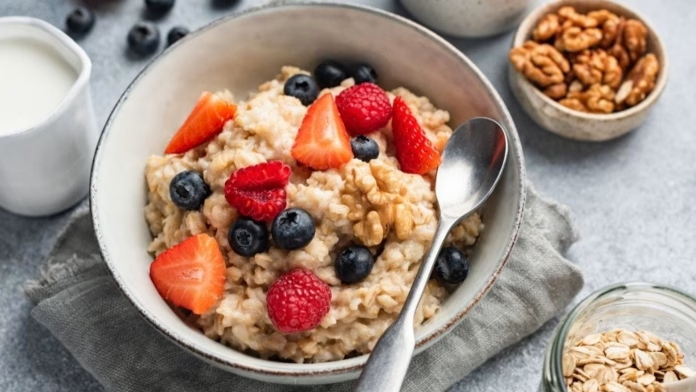In a world driven by health-conscious choices, oats have emerged as a star player in the breakfast arena. These humble grains, packed with nutrients and praised for their fiber content, have become a breakfast staple for those seeking a healthy diet or weight loss. However, the question lingers: Are oats actually healthy for breakfast? Let’s embark on a captivating exploration of the pros and cons of oats, unraveling the truth behind this widely acclaimed morning meal.
The Tug of War: Pros and Cons of Oats for Breakfast
As with any dietary decision, there are always two sides to the coin. While oats are generally safe and well-tolerated by most individuals, there are exceptions to the rule. It is crucial to understand when consuming oats can have adverse effects, outweighing their potential benefits.
- Gluten Sensitivity or Celiac Disease: A Delicate Balance
Oats, in their purest form, are naturally gluten-free. However, there is a risk of gluten contamination during processing. For individuals with gluten sensitivity or celiac disease, consuming oats that are not explicitly labeled as gluten-free can be problematic. To avoid potential cross-contamination, it is essential to choose certified gluten-free oats, which undergo rigorous processing and testing to meet strict gluten-free standards.
- The Elusive Oat Allergy: A Rarity to Beware
While rare, some individuals may have an allergy to oats. This allergy can manifest in various forms, such as digestive issues, skin reactions, or respiratory symptoms. If you experience adverse symptoms after consuming oats, it is advisable to consult with a healthcare professional to determine if an oat allergy is the culprit.
- Navigating Digestive Issues: The Fiber Factor
Oats are renowned for their fiber content, which is generally beneficial for digestive health. However, individuals with specific digestive conditions, such as irritable bowel syndrome (IBS) or inflammatory bowel disease (IBD), may find that high-fiber foods like oats can trigger uncomfortable symptoms such as bloating, gas, or abdominal discomfort. In such cases, moderation or exploring lower-fiber alternatives may be the recommended course of action.
- Personal Sensitivities and Intolerances: Unraveling the Individual Puzzle
The human body is a complex mosaic, and sometimes, certain individuals may have personal sensitivities or intolerances to specific components within oats. For instance, avenin, a protein found in oats, may cause discomfort or adverse reactions in some individuals. If you experience any unfavorable responses after consuming oats, consulting with a healthcare professional can help unveil the underlying cause and guide your dietary choices.
Unlocking the Benefits of Oats for Breakfast
With the potential pitfalls carefully examined, it’s time to shift our focus to the bright side—the myriad benefits that oats can offer for breakfast enthusiasts. By selecting the right kind of oats—free from excess sugar, salt, preservatives, and additives—breakfast becomes a gateway to a treasure trove of advantages.
- The Fiber Fountain: Promoting Digestive Health
Oats boast an exceptional fiber content, comprising both soluble and insoluble fibers. Of particular interest is beta-glucan, a soluble fiber found in oats, which has been linked to numerous health benefits. These include reduced cholesterol levels, improved heart health, enhanced digestion, stabilized blood sugar levels, and increased satiety, aiding in weight management.
- Nutrient Nirvana: A Wholesome Powerhouse
Oats are not just a one-trick pony; they shine bright as a nutrient-rich powerhouse. They offer a host of essential nutrients, including manganese, phosphorus, magnesium, copper, iron, zinc, and B vitamins. Additionally, oats contain avenanthramides, antioxidants with anti-inflammatory and heart-protective properties. By incorporating oats into your breakfast routine, you provide your body with a wide array of vital nutrients.
- The Energy Elixir: A Slow-Burning Sustenance
Thanks to their low glycemic index (GI), oats provide a slow and steady release of glucose into the bloodstream. This sustained energy release keeps blood sugar levels stable, provides long-lasting energy throughout the morning, and helps curb cravings and overeating.
- A Canvas for Creativity: Versatile and Adaptable
Oats are like a blank canvas, ready to be transformed into culinary delights that suit various tastes and dietary preferences. Whether you savor a warm bowl of oatmeal, indulge in overnight oats, blend them into smoothies, incorporate them into baking recipes, or shape them into delectable granola bars, oats offer endless possibilities. This versatility allows you to create a balanced and enjoyable breakfast routine tailored to your preferences.
Final Thoughts: Weighing the Oats
So are oats actually healthy for breakfast? The answer lies within the intricate web of personal health circumstances, dietary restrictions, and individual tolerances. While oats offer a multitude of benefits for those without gluten sensitivity, oat allergies, digestive issues, or personal sensitivities, it is essential to approach oat consumption mindfully. By selecting oats free from harmful additives and considering your specific health needs, oats can indeed be a nourishing addition to your breakfast repertoire. As always, seeking personalized advice from healthcare professionals or registered dietitians will help you make informed decisions tailored to your unique requirements. So, as you ponder your breakfast choices, remember that the oats you choose today can set the course for a healthier tomorrow.





